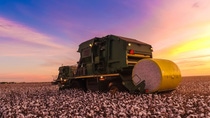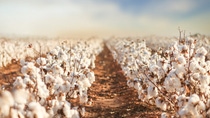Media
Next-level sustainability: ‘farm to retail’ traceability
BASF pioneers cotton program that lets you trace how your clothing was made.

Ever look at your cotton-made attire and wonder, where did that come from? How was it grown and does it deliver improvements from a sustainability standpoint?
Now, all those questions can be answered thanks to a new technology developed by BASF. The global company’s agricultural solutions business created a one-of-a-kind e3 sustainable cotton program. Why is it called e3, you might ask? Because customers know their clothes meet all three E’s – they’re socially equitable, economically viable and use environmentally responsible sustainable practices. (The three pillars of sustainability are society, environment and economy, and this program covers all three.)
The unique program delivers the comprehensive level of e3 cotton farm-to-retail traceability, along with third-party verification and BASF certification.
This means that every e3 cotton field through every stage of the supply chain is tracked. You know who grew the cotton, as well as where it was grown. This cotton-tracing technology offers clothing brands a unique opportunity –the ability to measure rather than eyeball the relative carbon footprint of a textile. Third-party verification ensures the authenticity of sustainably grown cotton. This process shows that cotton was grown in the United States, under care of farmers striving to continuously improve their sustainability impact while producing the highest-quality cotton for apparel and home furnishing.
How did it all start?
The cotton traceability program originally started in 2013, under a different name and under a different company, later bought out by BASF, but didn’t take off until the market was ready. It wasn’t until 2018 when the ‘farm to table’ movement started to take shape that BASF Fiber Development & e3 Sustainable Cotton Program Manager Jennifer Crumpler and her team decided to follow suit with transparency in the fabric value chain. The program then took off in 2019 and 2020, moving to a wider scale.
“BASF is a cottonseed company, therefore we feel it’s just as important to know where the materials come from that are on your body, as well as the food in your body,” said Crumpler.
Apparel and food often cater to the same socially conscious consumers. Three quarters of U.S. respondents said concerns about environmental change are very real and require a change in behavior, according to a 2019 Pew Research Center survey. The study found that consumer concern for sustainability affects shopping behavior of 63% of consumers globally, including 44% in the U.S.
It is also no secret that sustainability is a high priority for BASF. After all, this concept is embedded in the company’s corporate purpose – creating chemistry for a sustainable future. Therefore, the global company puts sustainability goals at the same level of importance as financial growth.
e3 sustainable cotton starts with certified FiberMax or Stoneville cotton seed, which are both valued for producing high-quality, high-yielding cotton. BASF is committed to bringing farmers improved seed options that will thrive in their fields and withstand environmental stresses, insect pressure and weather conditions, such as drought or flooding.
“No other cottonseed company in the world does what we do,” Crumpler added. “At BASF, we’re not just making commitments to sustainability, we’re bringing solutions and answers and we’re taking action. We know one pillar of sustainability is the environment, which is one of our E’s for each e3.”

How does it work?
BASF pays its farmers $2.50 per bale premium for every bale of e3 sustainable cotton that is enrolled in the program. That can then be invested back to improve sustainability on their farm, creating a partnership thanks to BASF’s digital platform. The company works with its farmers to identify areas and capture information on sustainability, and then it helps the farmers to look for ways to improve.
“Being environmentally responsible, that’s where we feel we really shine compared to any other program out there,” Crumpler said. “We capture a lot of data with our digital platform; and for us, it goes into proactively being able to tell our farmer’s story.”
BASF works with different brands and textile mills to create the demand for e3 sustainable cotton, helping them ask for it specifically by name. Afterwards, the company works with the merchants and others to provide a certificate of sustainability.
What’s next?
Crumpler and her team are not stopping just with the traceability program. They’ve recently launched the e3 sustainable grower fund, the sole fund of its kind meant to invest in farmers and bring value back to the farm.
“The e3 sustainable cotton program gives farmers a voice on how we use our farm products,” said Donny Lassiter, of Lassiter Family Farms, Creeksville, NC, who produces cotton in addition to other crops. “The program allows the brands and retailers that use our products to know about the ‘good things’ we do and improve on the farm. Those brands learn the ‘how’ and ‘why’ of what we as farmers do what we do.”
Through e3 sustainable cotton, BASF is proud to be recognized as helping meet the 2025 Sustainable Cotton Challenge. Today, 19% of the world’s cotton is more sustainable. By 2025, the vision of this challenge is that more than 50% of the world’s cotton is converted to more sustainable growing methods. More brands and retailers are joining the challenge and committing to sourcing certified and verified sustainable cotton. Some of the brands that have participated in the BASF program with farm-to-closet clothing built around trackable American cotton include Wrangler (denim), Todd Snyder, Trindad3, Imogene + Willie, and Caswell-Massey to name a few. Most recently, famed British rock band Coldplay collaborated with BASF partner General Standard for the Coldplay X One Tree Planted collection of ethically sourced concert T-shirts.
“We are the only sustainability initiative on a global level that really looks at the economics and the value back to the farmers,” Crumpler concluded.
To learn more about BASF’s e3 sustainable cotton program or to participate, click here.
Published in March 23, 2021 by Anna Spiewak.
For media inquiries or to repurpose the story, please contact: odessa.hines@basf.com or anna.spiewak@basf.com.
